The Capillary Wave

#9. What is Evidence?
A Capillary Wave Article Via: C M EDWARDS November 2023
A Commentary on What Constitutes Evidence

Introduction
If you are new to this subject matter, and have read these numbered articles from the start, it is possible that you have started your own journey of awakening, and self realisation. That is not meant to sound all mysterious and mystical; it is just that, that is what happens when you begin to realise that you have been acting as, and accepting a belief that you were something, that you are not: a person. See the section in Article #5, The People Have Been Represented. Maybe your perspective has completely changed, or at least, is changing? I was an average common man, with an average common perspective. When I started to learn some of this information, my perspective completely changed. Law and governance is all about your perspective, what you perceive; it is all about your mind, and what you believe, and your convictions. Maybe you used to believe a lie, something that was not real, something that was false, a [legal] fiction? Why do you think persons get convicted of their “convictions” at court? They get convicted of what they are convinced of; their convictions, their perceptions of the world. What happens if you change your convictions, your perception, and get another; a different conviction? Can you convict me, on your perceptions, and convictions? Can I convict you on my convictions? What are you convinced of? Were you convinced of a lie; a be-lie-f?
Convicted Of A False Conviction
A Citizens Perception – The Third Class Citizen – The Commoners
We see that most commoners believe that they “live in the United Kingdom (UK)”; that is their conviction. You might be realising now that, that is an impossibility, because people can not “live” in a polity, a body politic, a fiction of the law; which is what the UK is. If I know that “living in the UK”, is impossible, but a Jury consisting of: citizen commoners (the Monarch’s subjects), believe that they “live in the UK”, they are likely to find me “guilty” on various aspects of my argument, because they have a different perception of things to myself. For a different perspective and discussion on what we know – see Article #2 What Do You Know?

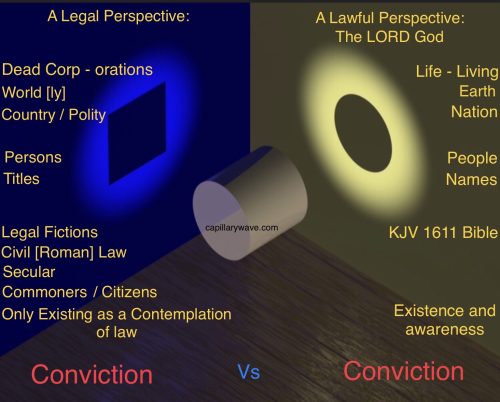
- Your King, your Monarch, is a “defender of the faith” – not a defender of a belief.
This is the reason why a Jury finds on the “facts”, and a Judge rules on the Law. A Judge is aware of the two jurisdictions, which is why he swears two oaths of office. See my comments on: The Judicial Oath. A Judge does not only have the citizens perspective, but also a Lawful perspective. Commoners share a common perspective, and one which is different from their rulers; perhaps that is why they remain commoners, citizens, and the subjects of a King.
- Legal maxim: Judici satis paena est quod Deum habet ultorem. It is punishment enough for a judge that he is responsible to God.
The Kings subject’s; the citizen commoners, share a common perspective: the legal, secular one, and therefore have little, to no idea about the Lawful jurisdiction, or the teachings of The KJV 1611 Bible. Jurors, very clearly believe something that is not real to be true, they believe a fiction, a legal fiction. A Jury believes that they “live” in the UK, they believe the impossible.
The fact that they are on the Jury in the first instance, is the biggest clue that they have little understanding of what The Bible teaches. They were selected to be on the Jury because they are the subjects of an Earthly King, which is contrary to the teachings of The Bible, ie they have evidently already pledged their allegiance to a new god, and have then become the subject of an Earthly King, and not God – See the first commandment . Article # 5 explains in more detail that transgression. The Jury have already broken The Law!
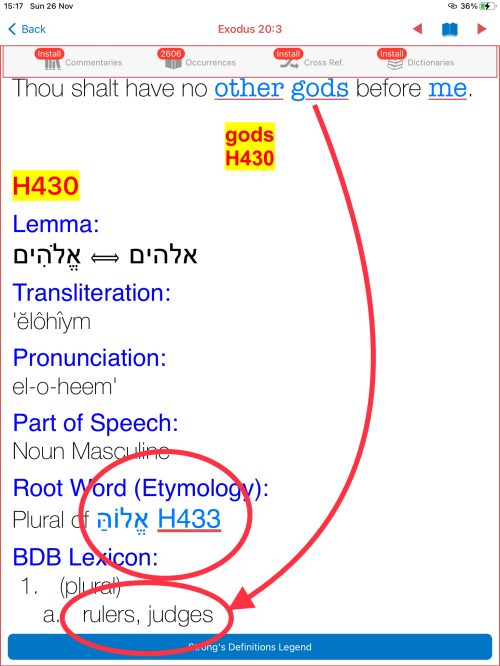
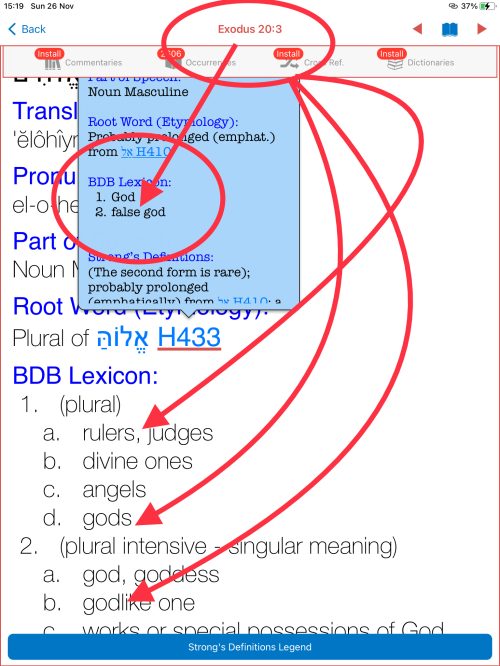
If some Jurors understood what they have done to enable themselves to be selected for jury service, I would wager that they would not wish to be a subject, or citizen commoner, any longer. Only a citizen registered on the electoral role can be selected for jury service. Most of the general population do not understand what a country is, let alone that they are not perhaps a: person. If you do not know what you are, and where you live, is it any wonder you fail every time in a legal argument? What is the first question a Police Officer or Judge asks:
– “Is your name Mr Smith, of 42, Crown Avenue, BA30 RU5, [United Kingdom]?” –
– ‘Yes sir”. [Liar. Theif. Guilty. Thou shalt not bear false witness, thou shalt not steal, thou shalt not have any other gods before me] – It is all over at that point, you lost. The Police Oficer asks that question because he has been trained to gather certain details, to confirm you are the citizen. A judge asks you those questions to see if you fall at the first hurdle, to see what your knowledge level is. There is a legal maxim that says “a judge judges for God”, and his oath would substantiate that. Given that fact, a judge then needs to ensure he is dealing with a commoner before he dishes out the punishment. He is “not allowed” to harm one of Gods because there are warnings about such things in The Bible. Whether you understand this or not is irrelevant to a judge and the law, this is the situation, defacto. You could say that a court case is a test on your knowledge of the KJV 1611.
I have heard two different judge’s, in different situations say to a guy, “render unto Caesar, that which is Caesar’s”; and another judge in the same case, at a different hearing called him a “thief”, and this was for a planning enforcement case, not a hearing for stealing! The “Caesar” comments were the judge effectively telling the guy that he belonged to the state. given what has been stated here you should by now, hopefully be beginning to understand why a judge might call you a thief in a planning case.
 I started to realise some of these arguments many years ago when I was beginning to understand some of these perspectives. The local council were insistent on my being “a person,” and using the title “Mr” against me, even before I understood much of this. I remember thinking at the time that this was strange, and it made me suspicious from the start. When I asked them to clarify what they meant exactly by calling me a person, and why they insisted on using a title against me, they could not answer, which made me even more suspicious; but at the time, I was not sure why it was so important to them.
I started to realise some of these arguments many years ago when I was beginning to understand some of these perspectives. The local council were insistent on my being “a person,” and using the title “Mr” against me, even before I understood much of this. I remember thinking at the time that this was strange, and it made me suspicious from the start. When I asked them to clarify what they meant exactly by calling me a person, and why they insisted on using a title against me, they could not answer, which made me even more suspicious; but at the time, I was not sure why it was so important to them.
Many of my “clients”, who also came to understand these positions on the law, were already involved in court cases. It was hard going in the early days, presenting a defence for a Jury who had no idea about what they were involved in. I soon learned that there is no point whatsoever trying to convince a Jury of my perspective (they had their own), it made more sense to reveal your case to the Judge, who understands both the secular, and Biblical perspectives on Law. Aside from the first commandment,
The Bible also often states things like this about the secular position:
- John 15:18 If the world hate you, ye know that it hated me before it hated you. 19 If ye were of the world, the world would love his own: but because ye are not of the world, but I have chosen you out of the world, therefore the world hateth you. 20 Remember the word that I said unto you, The servant is not greater than his lord. If they have persecuted me, they will also persecute you; if they have kept my saying, they will keep yours also. 21 But all these things will they do unto you for my name’s sake, because they know not him that sent me. 22 If I had not come and spoken unto them, they had not had sin: but now they have no cloke for their sin. 23 He that hateth me hateth my Father also. 24 If I had not done among them the works which none other man did, they had not had sin: but now have they both seen and hated both me and my Father. 25 But this cometh to pass, that the word might be fulfilled that is written in their law, They hated me without a cause:
- cause (n.) c. 1200, “reason or motive for a decision, grounds for action; motive,” from Old French cause “cause, reason; lawsuit, case in law” (12c.), and directly from Latin causa “a cause; a reason; interest; judicial process, lawsuit,” which is of unknown origin. From mid-14c. as “cause of an effect; source, origin.” From late 14c. as “that which affords opportunity for a cause to operate, occasion;” also “reason for something taking place or for something being so; rational explanation.” Also late 14c. as “proper or adequate reason, justification for an action.” The sense of “matter of interest or concern; a side taken in controversy” is from c. 1300. Cause célèbre “celebrated legal case” is 1763, from French.
Throughout all of these articles, the biblical quotes align with the legal processes, and word definitions. The Bible constantly warns the reader, and explains how to avoid the pitfalls.
Imagine then, being in the witness box for a planning enforcement case. Imagine explaining to a Jury that you have caused nobody any harm, and that the “house you built” is not in the UNITED KIGDOM. I am sure you can imagine the outcome from the public gallery, and the Jurors perspective. Guilty! (if not insane). However, the Judge is very likely to have a different perspective, from that of the Jurors; which we have read about before: like when Pontius Pilate, (a Judge) is able to “wash his hands” of the guilt, because it was the citizens of the jury who condemned Jesus, and you. This is the biblical verse where the popular legal term and maxim: “clean hands in equity,” comes from; Matthew 27:24, KJV 1611:
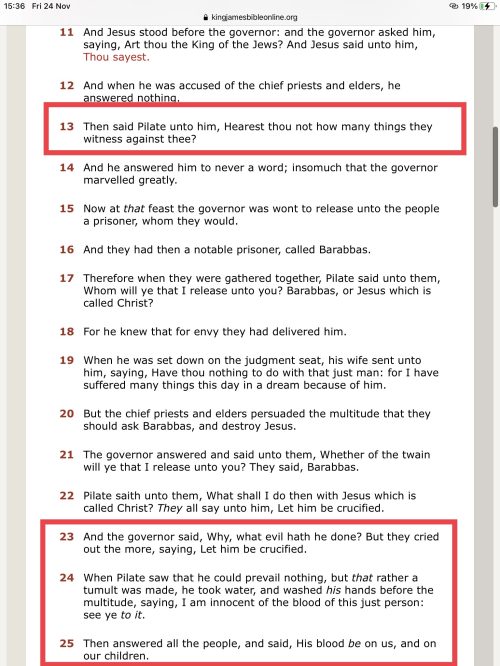
What I have revealed here for you, is not commonly known by the commoners, those members of the third estate of the realm: The House of Commons. These public articles are only the very basics, step one if you like, the baby steps, there is much more to understanding law and governance, and we will be continuing these discussions with Gold and Silver members of The Capillary Wave – come and join us.
Understanding this subject of law and governance in my view is essential, and I hope my articles have helped you immensely, after all, that is my sole purpose, and intention for creating them; to be a help to you, and to perhaps change your current common perspective.
This will be a brief article which will touch on various aspects of what constitutes evidence, and some of the subjects around that. I think back to my own legal planning enforcement issues in 2007/08. The local council were making certain statements to me, about what I could, and could not do on some Land, and what would happen to me if I did not do as they said. I was like a deer in the headlights at the time, although I do remember it got me starting to read legislation. The Act that was relevant to my predicament, and the Act the council themselves quoted at me was: The Town and Country Planning Act 1990. When I first started reading legislation, it was like reading a foreign language. Not much of it made sense to me. As with most things, the more you study, the better you get.
I will give you a planning enforcement “case study” in a later section here, which I hope will prompt you to think of some pointers, on how you might think about tackling your own legal issues.
To have the greatest chance of success in any legal wrangle, you will need to:
- Properly understand your situation. If you are reading this as a commoner, as I was back in 2007/08, and you have read all of my articles in ascending numerical order, there is a chance that your perspective on things is changing. Your conviction may be shifting, your idea of what you are, and what you thought the world is, or was, is changing, or is shifting. I mentioned in the “About Page” that my perception in 2007 was that I was neck deep in legal problems, but that was only my perception at that time, which is much like your perception now, but that might be changing for you. That could be the beginnings of your success, as it was mine.
I began to realise that perhaps I was not the thing (person) that they were saying I was. Imagine my predicament back then, not even knowing this most basic of information about law and governance, and attempting to fight a legal adversary. It is no wonder so many fail so badly. I am sure many commoners, sadly, have no idea what is being stated by their adversaries in their paperwork (as was the case in my own situation). Commoners then, have no real clue about what it is that they are involved in, and no idea as to why a strange person in “government” can essentially make demands of them. To properly understand a situation, you will need to properly understand your own status and capacity, and to understand who or what your legal opponents truly are.
With my potential opponents, I always start with obtaining a full name, job title, and I get the name of the organisation they are representing. These three items alone hold some real power, once you have this information, then you have someone who is accountable for what is said and done. This immediately rules out most con men over the phone, as a con man will either not have this most basic of information, or will not wish to divulge it to you .
Then I go to Companies House and find out who the persons are that run and Direct that company. Once I have this information, when I reply to that organisations employee, I write back to the individual who initially contacted me, and I also address the letter, and write to the Director of that company. Now all eyes are on the employee to get things right, and the Director is ultimately responsible for everything that company does, and can not claim no knowledge of the case, since he / she is now receiving letters. Now there is some liability being created on your opponents side, and not just your own. If say, the adversary is a bailiff, I also copy in their governing body, and I will copy in the relevant government department that oversees that industry. This way there is accountability all the way to the very top (or bottom depending on your perspective).
If you are interacting with a large company, a tactic that they will often use, is to have a different employee from another department write back to you. This is why I always write to the same initial employee that initiated contact with me, and why I also include the company Director in my correspondence. This maintains a liability on their side, and the Director is always in the conversation, and will be keen to have the situation resolved properly. You will need to understand your opponents governing bodies if they have one, and or, what rules limit your adversaries actions, what are your opponents rules for engagement etc. If you have some organisation, or authority, writing to you, they will almost certainly have rules, policies, guidelines, and laws that they must obey. If you do not know what their rules are, or what laws bind them, how can you possibly make sure that your adversary is sticking to the rules of engagement? Not only that, but if they act outside of those rules, that may be your first “win” in the case, and they may drop their case against you there and then. If your adversary can see that you are knowledgeable, serious, organised, diligent, and determined, they may think twice about tackling you. And that is just for starters. Take the online, social media, common law community as an example of how not to do things. They do not understand who or what they are, they do not understand what jurisdiction they are in, and they are making the wrong arguments. It is no wonder they lose. My article on The Common Common Law Trap For Commoners may be of interest to you. - Know where to obtain the relevant evidence to support your position, and learn to argue! Once you understand properly the situation you are in, and your status and capacity, you can begin to strategise, and formulate a plan to begin to get yourself out of that situation. Your adversary will be making certain statements about you in their letters to you, and about other aspects of their claims against you. Everything on that letter [in black and white] is up for discussion and argument. And I mean absolutely everything. There is a legal maxim that says “He who does not deny admits”. In other words; what you do not challenge will be seen as; agreed, by a Judge. I do not mean be argumentative for the sake of it, I mean examine the document diligently, and thoroughly examine every word with a dictionary, determine the crux of their argument, and then challenge what needs to be challenged. I can guarantee you, that there will be aspects of any letter that can be challenged, especially if your conviction, and perspective is beginning to change. You absolutely, must be diligent, and determined. There are some Acts of Parliament that bind citizens, and there are some Acts of Parliament that bind authorities, and your adversary. You need to find out which ones will help you, as the citizen that you currently are, and which ones bind and limit your opponent. I will start you off with one of each. Your job is to find the rest. Bill of Rights [1688] and the Fraud Act 2006. The Bible (KJV 1611) is full of wisdom, and it has this to say at Matthew 5:25.
- If you have points 1 and 2 in order, then you will need to get evidence that will support your claim. Your adversary will have sent you letters. You will need to keep them in chronological order. You will need to examine what they are saying / claiming, and you will need evidence to refute their claims. Their letters to you, can, in most cases, prove your case (be-lie-ve it or not), especially if you have the right knowledge, and your perspective has changed. If you manage to refute all of their claims with evidence, and hold them to account, then the chances are they will drop the case, even a “criminal” one, like the one I was facing over a planning enforcement matter. This is what is meant by “agree with thine adversary”: See – Matthew 5:25. If they go silent on you, you will still need to write to them, and tell them that if you do not hear back from them in writing within 14 days, then you will consider the matter settled and closed. If they reply outside of the 14 days, you need to have the confidence to leave it, especially if they do not supply a good, or valid reason; do not reply. That can be known as, or is similar to an estoppel, whereby your adversary, and yourself, have had communications back and forth, trying to resolve the issue, for which you will have diligently supplied the evidence, and refuted their assertions. The fact that hey then stopped writing to you, is not your fault, which is why you gave them a further 14 days to respond. If they failed to respond within the 14 days, it makes it very hard to re open the”case” in (civil terms), and would look very bad at court for your opponent. A local council will ignore most if not all of your letters (in a planning dispute), do not let that stop you making your argument. Part of taking on an adversary, is equipping yourself with knowledge, with knowledge comes confidence. The types of evidence that will support your claim, will depend on the situation you have. If it is a civil dispute with your builder, then text messages, emails, CCTV, contracts, invoices, witness statements from neighbours, building regulations code, Building Federations/Governing Bodies policy, and guidelines, relevant Acts of parliament, are some examples of the types of evidence you can use in that situation. As a tip, whatever business you are involved in with others, you will need to have a paper trail to be in a strong position, and preferably with their signature on the paperwork of that paper trail. If you have a paper trail to support your claims, which is also signed off, and agreed by your “adversary” (a contract for example), then you have a very strong position to start with, and this alone may stop any legal claims against you in its tracks – agree with thine adversary! The Bible seems to have all of this covered.
- Note. What I have listed out here, is for civil matters, and covers civil disputes in general. If you have HM Revenue & Customs, a Bank, a local authority, a Bailiff, and the like writing to you, I absolutely guarantee that you can can win, if you have a new perspective, and a new conviction. We have been analysing legal and lawful perspectives, and have explored these positions in good detail within my numbered articles here. Note: If you have actually harmed someone (ie a criminal matter), then you are going to face the consequences of carrying out that harm, there is no new perspective, or evidence, that is going to change that, and nor should it, because you: broke the Law.
What Is Court?
The lens with which I am talking about court, is the lens which I am most familiar with, that being citizens vs local authorities, and various other government bodies. I have also had some dealings against banks, and bailiffs, so that experience will be leaned on as well. I am sure my explanation will be a very different one than you would get from a Barrister, however, mine is from a practical, common man’s perspective. A perspective where others opinions did not matter, just results.
What is court? – in a nutshell: court is paperwork. Court is your paperwork Vs their paperwork. Of course what you say is also important, but at court, your opponents will present various letters, and supporting evidence: plans, emails, Notices, Photographs, which they will have previously sent to you in their correspondence; and usually you will present your bits of paper; letters, emails etc and the Jury will make a decision based upon the facts (for a planning enforcement case). But wait… court is also clearly about convictions too:
- conviction (n.} mid-15c., “the proving or finding of guilt of an offense charged,”…Meaning “mental state of being convinced or fully persuaded” is from 1690s; that of “firm belief, a belief held as proven” is from 1841. In a religious sense, “state of being convinced one has acted in opposition to conscience, admonition of the conscience,” from 1670s.
I have alluded to, and said in almost all of these articles, that this is all about your mind. I hope that definition of the word conviction just hammers that point home to you now.
- Govern – To control
- Ment – mental, Mensa, mens rea – Mind
- Romans 12:2, KJV 1611 – And be not conformed to this world: but be ye transformed by the renewing of your mind, that ye may prove what is that good, and acceptable, and perfect, will of God.
- Romans 1:28, KJV 1611 – And even as they did not like to retain God in their knowledge, God gave them over to a reprobate mind, to do those things which are not convenient;”
Worldly affairs are those things that are (see Article #6 Chapter – Civil Law that which is legal) in opposition to consciousness and morality. Also see – Legality Vs Morality
- conscience (n.) c. 1200, “faculty of knowing what is right,” originally especially to Christian ethics, later “awareness that the acts for which one feels responsible do or do not conform to one’s ideal of right,” later (late 14c.) more generally, “sense of fairness or justice, moral sense.” This is from Old French conscience “conscience, innermost thoughts, desires, intentions; feelings” (12c.) and directly from Latin conscientia “a joint knowledge of something, a knowing of a thing together with another person; consciousness, knowledge;” particularly, “knowledge within oneself, sense of right and wrong, a moral sense,” abstract noun from conscientem (nominative consciens), present participle of conscire “be (mutually) aware; be conscious of wrong,” in Late Latin “to know well,” from assimilated form of com “with,” or “thoroughly” (see con-) + scire “to know,” probably originally “to separate one thing from another, to distinguish,” related to scindere “to cut, divide,” from PIE root *skei- “to cut, split” (source also of Greek skhizein “to split, rend, cleave”). The Latin word is probably a loan-translation of Greek syneidesis, literally “with-knowledge.” The sense development is perhaps via “to know along with others” (what is right or wrong) to “to know right or wrong within oneself, know in one’s own mind” (conscire sibi). Sometimes it was nativized in Old English/early Middle English as inwit. Russian also uses a loan-translation, so-vest, “conscience,” literally “with-knowledge.”
Before reading these articles, was your perception one of “being convinced in opposition to conscience”, as defined above? In opposition to that which is moral; it does not say: in opposition to that which is legal / civil. Civil affairs are legal affairs of the state, civil affairs are what is: worldly, civil, secular, and secular is in opposition to God, as the definition evidences:
- civil (adj.) late 14c., “relating to civil law or life; pertaining to the internal affairs of a state,” from Old French civil “civil, relating to civil law” (13c.) and directly from Latin civilis “relating to a society, pertaining to public life, relating to the civic order, befitting a citizen,” hence by extension “popular, affable, courteous;” alternative adjectival derivative of civis “townsman” (see city). Meaning “not barbarous, civilized” is from 1550s. Specifically “relating to the commonwealth as secularly organized” (as opposed to military or ecclesiastical) by 1610s. Meaning “relating to the citizen in his relation to the commonwealth or to fellow citizens” also is from 1610s.
- secular (adj.) c. 1300, seculer, in reference to clergy, “living in the world, not belonging to a religious order,” also generally, “belonging to the state” (as opposed to the Church), from Old French seculer, seculare (Modern French séculier) and directly from Late Latin saecularis “worldly, secular, pertaining to a generation or age,” in classical Latin “of or belonging to an age, occurring once in an age,” from saeculum “age, span of time, lifetime, generation, breed.”This is from Proto-Italic *sai-tlo-, which, according to Watkins, is PIE instrumental element *-tlo- + *sai- “to bind, tie” (see sinew), extended metaphorically to successive human generations as links in the chain of life. De Vaan also connects it with “bind” words and lists as a cognate Welsh hoedl “lifespan, age.” An older theory connected it to words for “seed,” from PIE root *se- “to sow” (see sow (v.), and compare Gothic mana-seþs “mankind, world,” literally “seed of men”). The ancient Roman ludi saeculares was a three-day, day-and-night celebration coming once in an “age” (120 years). Ecclesiastical writers in Latin used it as those in Greek did aiōn “of this world” (see cosmos). It is the source of French siècle “century.” The meaning “of or belonging to an age or a long period,” especially occurring once in a century, was in English from 1590s. From mid-14c. in the general sense of “of or belonging to the world, concerned in earthly more than in spiritual, life;” also of literature, music, etc., “not overtly religious.” In English, in reference to humanism and the exclusion of belief in God from matters of ethics and morality, from 1850s. Related: Secularly.
I mentioned in my Introduction, that a solution to all of your legal problems, would have to be available to the common man if we are not living in a tyranny. A solution is available, everyone can afford a dictionary, and almost everyone has as a mobile device that can access legislation, and The Bible. Most of my articles add further explanation to what is defined in the words themselves, and why those definitions state what they state. I also mentioned in What Do You Know that we do not know half of what we think we know. I would argue that applies to all, if not most commoner citizens. The fact that they are a commoner would itself imply, that they do not know how they are being governed, if they fully understood what a commoner was, and what civil law was, they might not wish to be: common anymore?
Court is only there as a last resort. If you are at court, it is because you either ignored correspondence from your adversary, or said “no” to something, or because you failed to reach an agreement in the private (prior to court, with your correspondence), or of course because you believe what your adversary said about you, what you are etc. Hopefully you can now see how vitally important your correspondence is. I never usually like to correspond with a potential adversary via email. Email is too informal, and too quick. Care needs to be taken over which words you choose to use, and time needs to be allowed for thought to rise, and emotions to calm. Also corresponding by letters buys you time. Sometimes, in my situation all those years ago, that time was spent researching, which paid off, you can not really do that when using email. Lastly, never write a letter, or send an email when you are angry, leave it a day or two, and spend the time researching what has actually been said.
At a crown court a Judge rules on the Law and a Jury will reach a verdict based on the facts. Is there a better way to argue at court, than by using your adversaries paperwork, rules, and laws against them? Can it be done? Absolutely, but only with a new perspective and conviction. For an overview of UK courts see – Article # 8. The court system may not be quite, what you thought it was.
A Case Study
Here is some typical paperwork that you might receive from a council in the UK with regards a planning enforcement scenario.
Photograph 1:
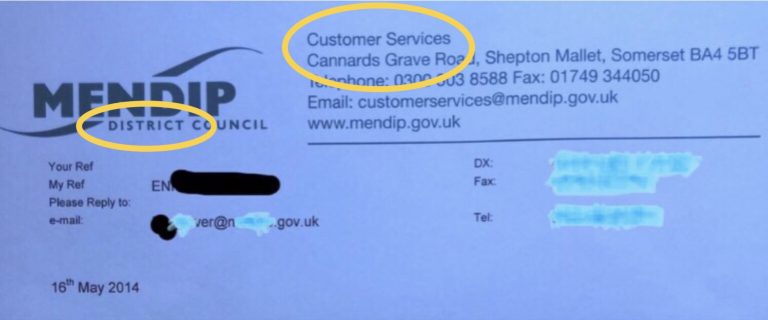
Photograph 2:
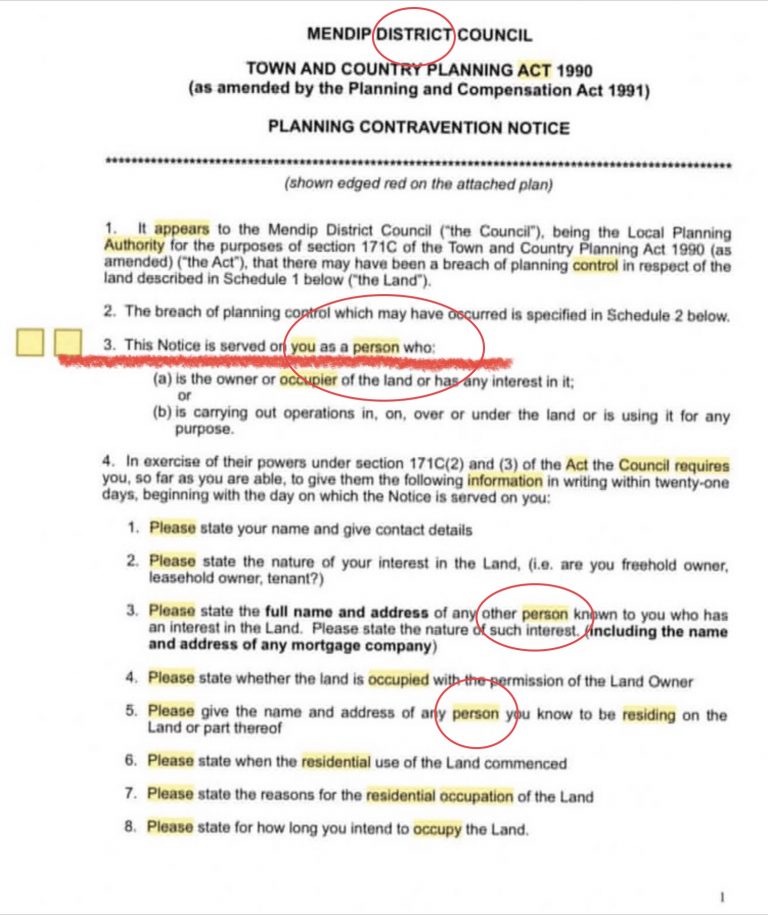
These two documents, are the type of correspondence you will get from a “local authority” in relation to a suspected “breach of planning control”. Given everything I have just stated above, it would be wise to closely examine these documents. These documents could very well be included as evidence in a court case against you. It would be wise to examine them closely before you panic and make a rushed written response, or worse; a telephone conversation, or an informal email a response.
For starters there are a lot of assumptions being made by the council in these documents. Some of those assumptions are (there are many more):
- That you are a “customer” (Photograph 1.).
- That they are “the [your] local Planning Authority”. (Photograph 2.)
- That you are “a person”. (See red marker on photograph 2.)
- That you own, occupy or have interest in the land in question.
- What do some of the above highlighted points even mean?
- Can you begin to formulate a letter of response to some of these points?
- If you can, is there any evidence you can rely on?
- Do you even need to provide evidence at this stage?
- Are they a council or local authority, and what is the difference?
- Why have they served this notice on you “as a person”, why not serve it on you, as what you are?
- Is it unreasonable to ask for some clarification on some of the points that you are unsure of?
- Does the council have a policy you can examine on Enforcement matters?
- Does the council have any other policies that might be significant and relevant to you? (Yes they do!)
- Is it worth examining the Town and Country Planning Act 1990?
- Is it worth buying a Law Dictionary to examine legal definitions of some of these words?
- Is it worth searching The Bible and legislation for word definitions?
These are a few of the questions that went through my mind many years ago, when I was faced with correspondence like this. Back then I did not know anywhere near what I now know, but I knew enough to ask questions. Hopefully this has opened up some new avenues in your mind with regards to how you might go about tackling your own adversary, with your own paperwork, with your new perspective.
- Qui bene interrogat, bene docet. He who questions well, learns well. 3 Buls. 227.
What Is Evidence?
Sounds like it should be an easy or obvious answer, but so many laypersons confuse “opinion”, professional, or otherwise, with actual evidence, and judging by so many social media posts, a photograph with some text on it, seems to pass as evidence in the court of public opinion.
What evidence should you consider using against your adversary, and what is admissible? (more to the point, what will aid you) The Crown has a list of Civil Procedure Rules and Criminal Procedure Rules to aid you with preparing a case and what is permissible etc which can be seen here:
This will be a very general overview, with a slant to this platforms topics as the back drop, with my opinion, and comments from my own experience, about the evidence you will need, and evidence which is admissible, and helpful at court to you.
- evidence (n.) c. 1300, “appearance from which inferences may be drawn,” from Old French evidence, from Late Latin evidentia “proof,” in classical Latin “distinction, vivid presentation, clearness” in rhetoric, from stem of Latin evidens “obvious, apparent” (see evident). Meaning “ground for belief” is from late 14c.; that of “obviousness” is from 1660s and tacks closely to the sense of evident. Legal senses are from c. 1500, when it began to oust witness. Also “one who furnishes testimony, witness” (1590s); hence turn (State’s) evidence.
- fact (n.) 1530s, “action, a thing performed, anything done, a deed,” good or evil but in 16c.-17c. commonly “evil deed, crime;” from Latin factum “an event, occurrence, deed, achievement,” in Medieval Latin also “state, condition, circumstance” (source also of Old French fait, Spanish hecho, Italian fatto), etymologically “a thing done,” noun use of neuter of factus, past participle of facere “to do” (from PIE root *dhe- “to set, put”). An earlier adaptation of the Old French word that also became feat. The older senses are mostly obsolete but somewhat preserved in such phrases as after the fact, originally legal, “after the crime.” Also compare matter-of-fact. The modern, empirical, sense of “thing known to be true, a real state of things, what has really occurred or is actually the case,” as distinguished from statement or belief, is from 1630s, from the notion of “something that has actually occurred.” The particular concept of the scientific, empirical fact (“a truth known by observation or authentic testimony”) emerged in English 1660s, via Hooke, Boyle, etc., in The Royal Society, as part of the creation of the modern vocabulary of knowledge (along with theory, hypothesis, etc.); in early 18c. it was associated with the philosophical writings of Hume. Middle English thus lacked the noun and the idea of it; the closest expression being perhaps thing proved (c.1500). Hence facts “real state of things;” in fact “in reality” (1707). By 1729, fact was being used of “something presented as a fact but which might be or is false.”
- proof (n.) c. 1200, preove “evidence and argumentation to establish the fact of (something) beyond reasonable doubt,” from Anglo-French prove, preove, Old French proeve, prueve “proof, test, experience” (13c., Modern French preuve), from Late Latin proba “a proof,” a back-formation from Latin probare “to prove” (see prove). “The devocalization of v to f ensued upon the loss of final e; cf. the relation of v and f in believe, belief, relieve, relief, behove, behoof, etc.” [OED]. The meaning “act of proving” is early 14c. The meaning “act of testing or making trial of anything” is from late 14c., from influence of prove.
Using the “Builder dispute” example again, the evidence you might rely upon will be relevant to that situation. So the evidence you might rely upon could be: invoices, Consumer Protection Act 1987, a contract signed by both parties before work commenced, Building Regulations, Companies House information, etc. The evidence will be paperwork which substantiates your claim against the Builder, breaching the terms of his contract, or not building the house to Building Regulation standards etc. What will not be considered as [helpful] evidence would be a book written by Kevin McCloud of TV show Grand Designs, because that would be opinion. Hopefully you get the idea.
Evidence has a hierarchy and The KJV 1611 Bible is at the top. Below are two Legal Maxims which are themselves regarded as law and can be used as evidenced to support your points:
- Argumentum ab impossibili plurmum valet in lege. An argument deduced from authority greatly avails in law. Co. Litt. 92.
- Argumentum ab authoritate est fortissimum in lege. An argument drawn from authority is the strongest in law. Co. Litt. 254.
Evidence from case law (common law), and UK legislation carries a lot of weight, as will your local council’s constitution, and policy handbooks. A book someone on the internet wrote on “common law” is not really going to cut it as “evidence”.
Note: of course in some trials, expert witnesses are called to give their expert opinions in specialist circumstances.These are by and large, not relevant for the purposes of most cases, and the discussions on this platform.
Moving on to an example that is fitting for this platform. Is an Englishman’s home his castle?:
If your adversary is a local authority, and you find yourself at court for “failing to comply with an enforcement notice”, then your evidence will need to be relevant and specific to your perspective, and that particular case, which might be: The Holy Bible, the Town and Country Planning Act 1990, the Councils Enforcement Policy, the councils constitutional document, etc. What will not be considered as evidence at court, will be a book by the Black Belt Barrister (BBB), or something he said in one of his YouTube videos. That will be professional opinion, and no generic legal opinion will override that of the Judge, and will not be specific to the case, so it is not “evidence”. Whilst the BBB comments and professional opinion may not be used in your evidence, it may be used as a good source of research, as a guide, a pointer. It may help to form your understanding of a topic, and subject. That advice may give you some relevant information, which may lead you to find some piece of legislation that is relevant; but in and of itself, the opinions of the BBB are not to be regarded as “evidence” that you can use in “your” court case.
Essentially, the evidence you will need to form your position of defence (whatever that may be), is paperwork that will aid you to establish your points. Whatever it is that you are claiming has happened, needs to be evidenced. Whatever you are claiming the council have done, needs to be evidenced. You have to be able to substantiate your claim with material evidence (paperwork). Yes, it can be done, and once you have a new conviction it is very easy to achieve. Using [their] Crown rules, and their legislation to prove your points is one of the keys to success. Using an authority “that everyone pre agrees, and accepts as the ultimate truth – “The KJV 1611 Bible” – is the ultimate evidence for defence, especially if you have no: status and are in the correct: capacity.
The Bible is often referred to as a “two edged sword”. We should all know not to be careless with a sword, as you could cut yourself if not handled correctly. Whilst The KJV 1611 Bible is the ultimate, and highest form of evidence, if you attempt to use it from the wrong status and capacity, or with little understanding of it, a Judge will use that [s]word against you, as he should, and as directed in The Book itself. The Bible is not a tool to just pick up when it suits you, to throw away after you have used it. A Book is presented to the Monarch at his or her Coronation and told “We present You with this Book, the most valuable thing this World affords”. If this Book is The Bible, then its teachings have a huge significance in the way a country is governed. If you have read the articles here, you will see a thread of Biblical quotes running through the articles. That is because your country and its laws are founded upon what is stated in that book. You can not have a serious discussion about law and governance without mentioning The Bible, just ask most Barristers:
All of those words which Barristers have chosen as names for their Chambers, are either mentioned in The KJV 1611 Bible , or are names referencing things mentioned in The Bible. If anyone tells you that The Bible has nothing to do with law and governance – walk away from them, and definitely do not take their advice.
If you are at court in a Lawful capacity, then you will argue the Law with a Judge. That is a separate conversation than trying to convince a Jury. Often when making a Lawful argument a Judge will ask the Jury to leave the court. I have witnessed this happen. The legal position is in opposition to the Lawful one, as we have evidenced and a Judge does not always wish a Jury to hear what some defendants wish to say.
For our planning enforcement case example: you are never at court for “failure to gain planning permission”, because it is not illegal to build your family a “house”, a “shelter”; obviously nor is it unlawful. Essentially, what you will be at at court for, in a planning enforcement case is: “failure to comply with an enforcement notice”. Put another way: you as a citizen commoner, and constituent, failed to ask the local authority for permission to “develop Land”. If you are at court for a planning enforcement case, and you are not a commoner, and you are there in the correct capacity, with no status, then the argument becomes: “I did not comply with the Enforcement Notice because…”, and not “why wont you let me build a house”.
If you are at court but not as a commoner, then you had best be able to point to some paperwork, some evidence, some authority, on just why you do not need to ask permission from a local authority. As the photographs below suggests. A matter (court case / argument) can have two different aspects, and two factual sets of evidence, from two opposing parties. If a local authority brings a case against someone who says they are not a citizen, and someone who is making a Lawful argument, then Crucially, one believes themselves to be correct (local authority), and one is correct. What is more, from the outset, the Jury will also believe the party that is incorrect; the local authority, because they too are citizen subjects, and commoners and they will share the same perspective as the local authority. Perhaps it was the same perception that you had, before reading these articles?
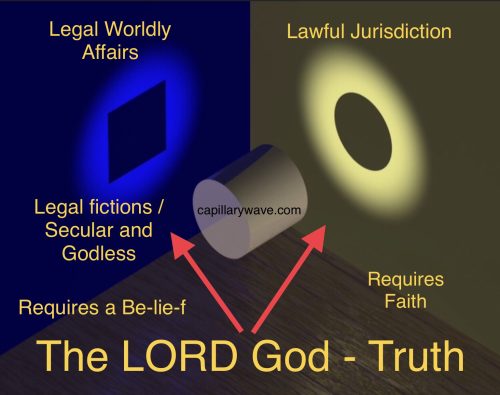
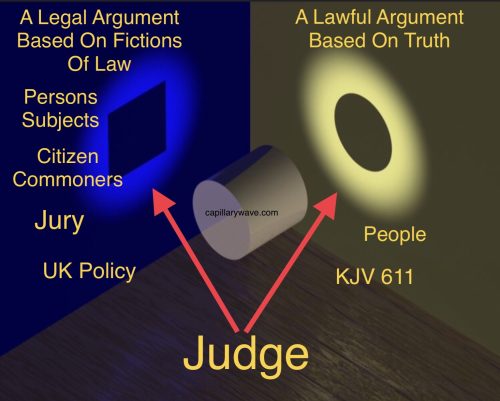
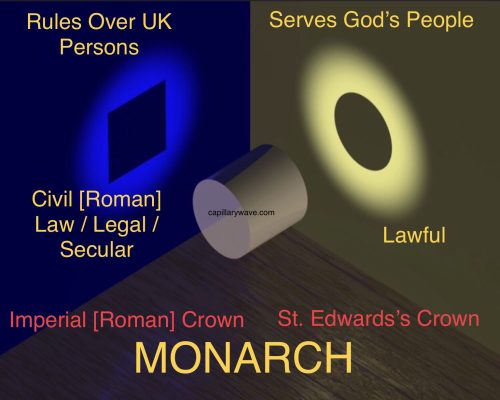
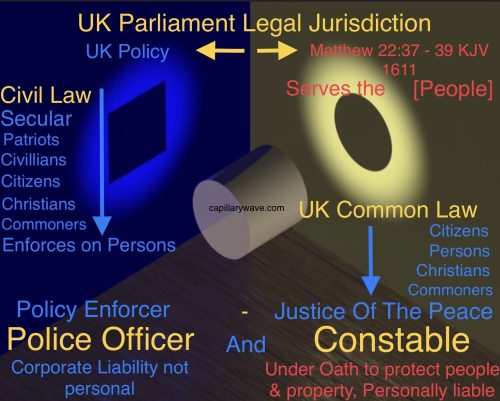
For an explanation of the position a Judge finds him / herself in, and why they swear two oaths of office, see Article #8 Section on The Judicial Oath
The definition of Juror is “character witness, person who swears an oath”. What does The Bible say about swearing an Oath:

Here are some useful Legal Maxims which can be a source of evidence for you:
- Justicia est virtus excellens et Altissimo complacens. Justice is an excellent virtue and pleasing to the Most high. 4 inst. 58.
- Judici satis paena est quod Deum habet ultorem. It is punishment enough for a judge that he is responsible to God. 1 Leon. 295.
- Jus est ars boni et aequi. Law is the science of what is good and equitable.
- Fiat justitia ruat caelum. Let justice be done, though the heavens should fall.
- Gravius est divinam quam temporalem laedere majestatem – It is more serious to hurt divine than temporal majesty.
- Jurare est Deum in testem vocare, et est actus divini cultus – To swear is to call God to witness and is an act of divine worship.
- Accusare nemo debet se, nisi coram Deo. No one ought to accuse himself, unless before God. Hard. 139.
- Contr negantem principia non est disputandum. There is no disputing against or denying principles. Co. Litt. 43.
- Est boni judicis ampliare jurisdictionem. It is the part of a good judge to extend the jurisdiction.
- Cui pater est populus non habet ille patrem. He to whom the people is father, has not a father. Co. Litt. 123.
- Ex facto jus oritur. Law arises out of fact; that is, its application must be to facts.
- Executio juris non habet injuriam. The execution of the law causes no injury. 2 Co. Inst. 482; Broom’s Max. 57.
- Fictio est contra veritatem, sed pro veritate habetur. Fiction is against the truth, but it is to have truth.
- Res judicata facit ex albo nigrum, ex nigro album, ex curvo rectum, ex recto curvum. A thing adjudged makes what was white, black; what was black, white; what was crooked straight; what was straight, crooked. 1 Bouv. Inst. n. 840.
- In judicio non creditur nisi juratis. In law none is credited unless he is sworn. All the facts must when established, by witnesses, be under oath or affirmation. Cro. Car. 64.
- communis error no facit just. A common error does not make law.
- Ad quaestiones facti non respondent judices; ad quaestione legis non respondent juratores. The judges do not answer to questions of fact; the jury do not answer to questions of law. Cu. Litt. 295.
- Affirmati, non neganti incumbit probatio. The proof lies upon him who affirms, not on him who denies.
- Argumentum ab inconvenienti est validum in lege; quia lex non permittit aliquod inconveniens. An argument drawn from what is inconvenient is good in law, because the law will not permit any inconvenience. Co. Litt. 258.
- Consensus facit legem. Consent makes the law. A contract is a law between the parties, which can acquire force only by consent.
- Cujus per errorem dati repetitio est, ejus consult dati donatio est. Whoever pays by mistake what he does not owe, may recover it back; but he who pays, knowing he owes nothing; is presumed to give.
- Culpa est immiscere se rei ad se non pertinenti. It is a fault to meddle with what does not belong to or does not concern you. Dig. 50, 17, 36.
- Cum adsunt testimonia rerum quid opus est verbis. When the proofs of facts are present, what need is there of words. 2 Buls. 53.
- Derativa potestas non potest esse major primitiva. The power which is derived cannot be greater than that from which it is derived.
- Dolosus versatur generalibus. A deceiver deals in generals. 2 Co. 34.
- Domus sua cuique est tutissimum refugium. Every man’s house is his castle. 5 Rep. 92.
- Error qui non resistitur, approbatur. An error not resisted is approved. Doct. & Stud. c. 70.
- Errores ad sua principia referre, est refellere. To refer errors to their origin is to refute them. 3 Co. Inst. 15.
- Ex dolo malo non oritur action. Out of fraud no action arises. Cowper, 343; Broom’s Max. 349.
- Expressio unius est exclusio alterius. The expression of one thing is the exclusion of another.
- Expressum facit cessare tacitum. What is expressed renders what is implied silent.
- Extra legem positus est civiliter mortuus. One out of the pale of the law, (an outlaw,) is civilly dead.
- Facta sunt potentiora verbis. Facts are more powerful than words.
- Factum negantis nulla probatio. Negative facts are not proof.
- Factum unius alteri nocere non debet. The deed of one should not hurt the other. Co. Litt. 152.
- Falsus in uno, falsus in omnibus. False in one thing, false in everything. 1 Sumn. 356.
- Fraus et dolus nemini patrocianari debent. Fraud and deceit should excuse no man. 3 Co. 78.
- Frustr legis auxilium quaerit qui in legem committit. Vainly does he who offends against the law, seek the help of the law.
- Idem est scire aut scire debet aut potuisse. To be able to know is the same as to know
- Idem non esse et non apparet. It is the same thing not to exist and not to appear. Jenk. Cent. 207.
- Identitas vera colligitur ex multitudine signorum. True identity is collected from a number of signs.
- Flumina et protus publica sunt, ideoque jus piscandi omnibus commune est. Rivers and ports are public, therefore the right of fishing there is common to all.
- Ignorantia legis neminem excusat. Ignorance of fact may excuse, but not ignorance of law. 4 Bouv. Inst. n. 3828.
- In criminalibus, probationes bedent esse luce clariores. In criminal cases, the proofs ought to be clearer than the light. 3 Co. inst. 210.
- In omnibus contractibus, sive nominatis sive innominatis, permutatio continetur. In every contract, whether nominate or innominate, there is implied a consideration.
- Incerta pro nullius habentur. Things uncertain are held for nothing Dav. 33.
- Inclusio unius est exclusio alterius. The inclusion of one is the exclusion of another. 11 Co. 58.
- Index animi sermo. Speech is the index of the mind.
- Intentio mea imponit nomen operi meo. My intent gives a name to my act. Hob. 123.
- Judex debet judicare secundum allegata et probata. The judge ought to decide according to the allegation and the proof.
- Judici officium suum excedenti non paretur. To a judge who exceeds his office or jurisdiction no obedience is due. Jenk. Cent. 139
- Juramentum est indivisibile, et non est admittendum in parte verum et in parte falsam. An oath is indivisible, it cannot be in part true and in part false.
- Jurato creditur in judicio. He who makes oath is to be believed in judgment.
- Lata culpa dolo aequiparatur. Gross negligence is equal to fraud.
- Le contrat fait la loi. The contract makes the law.
- Leges humanae nascuntur, vivunt et moriuntur. Human laws are born, live and die. 7 co. 25.
- Legitime imperanti parere necesse est. One who commands lawfully must be obeyed. Jenk. Cent. 120.
- Les fictions naissent de la loi, et non la loi des fictions. Fictions arise from the law, and not law from fictions.
- Lex non requirit verificare quod apparet curiae. The law does not require that to be proved, which is apparent to the court. 9 Co. 54
- Lex punit mendacium. The law punishes falsehood.
- Lex semper dabit remedium. The law always gives a remedy. 3 Bouv. Inst. n. 2411.
- Lex succurit ignoranti. The laws succor the ignorant.
- Malum quo communius eo pejus. The more common the evil, the worse.
- Malus usus est abolendus. An evil custom is to be abolished. Co. Litt. 141.
- Manifesta probatione non indigent. Manifest things require no proof. 7 Co. 40.
- Loquendum ut vulgus, sentiendum ut docti. We speak as the common people, we must think as the learned. 7 Co. 11.
For more Maxims, see the Maxim Page .
Government & God
Some quotes and thoughts from Lord Denning on law and Scripture He was a very famous, and well respected English Judge.
- Source:Lord Denning
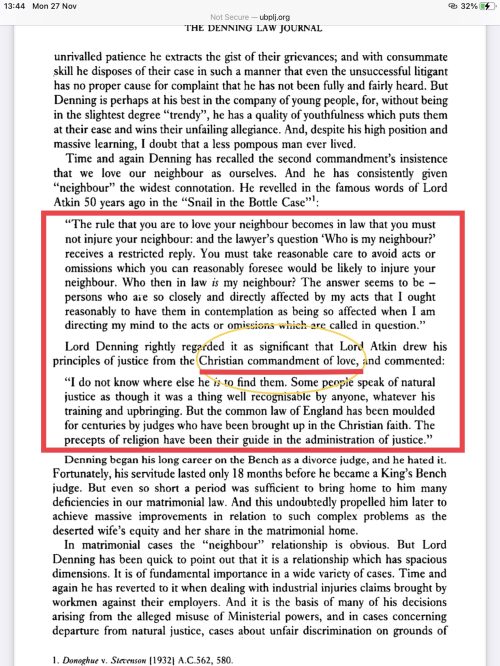
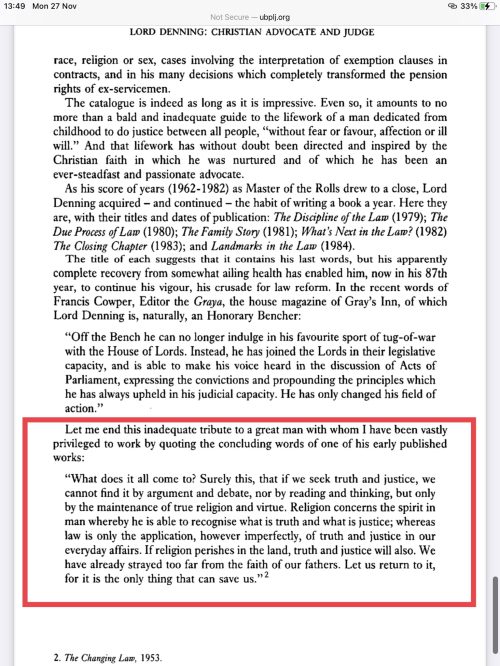
Source:
Lord Denning
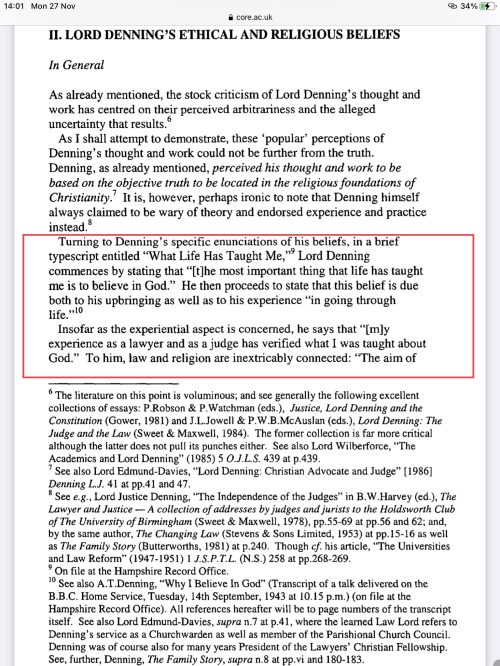
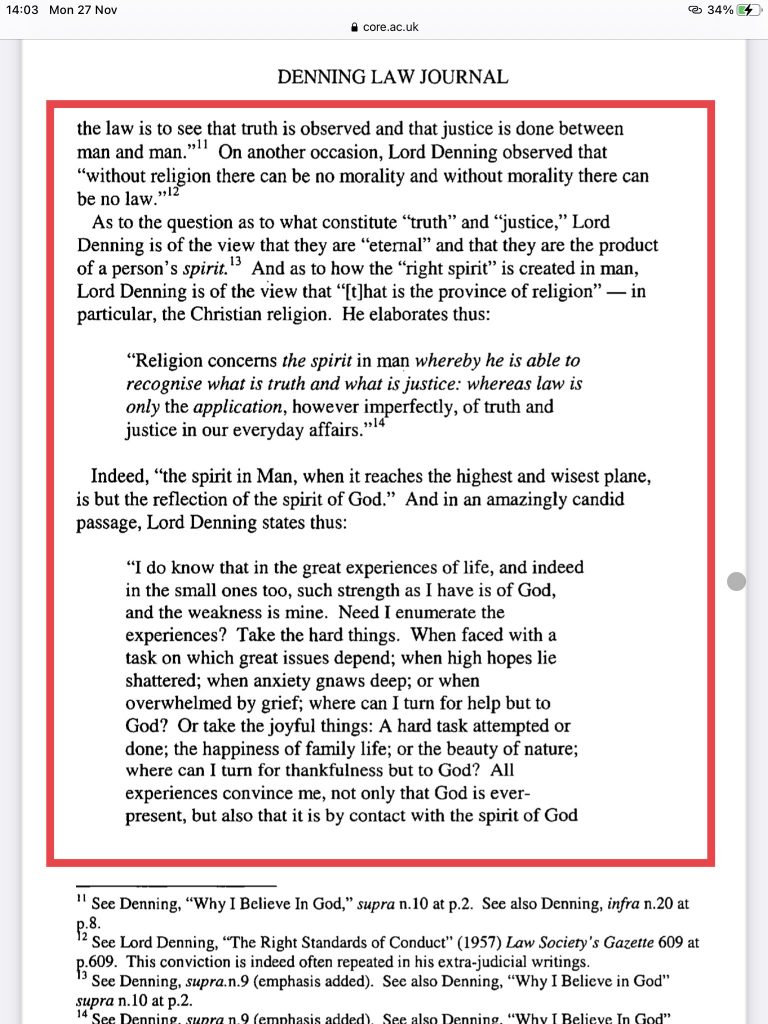
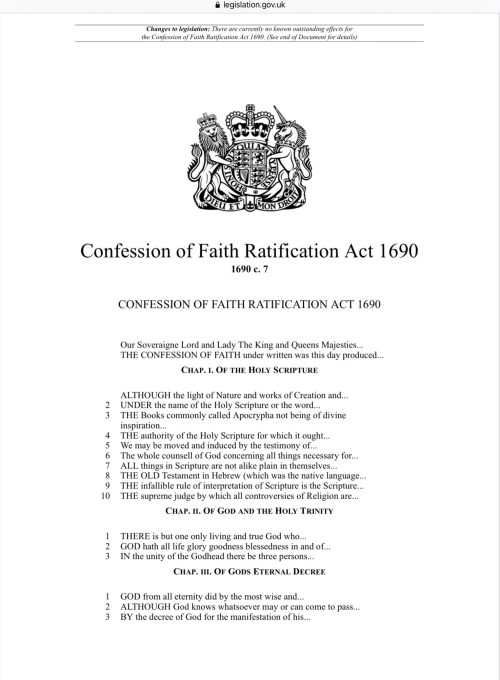
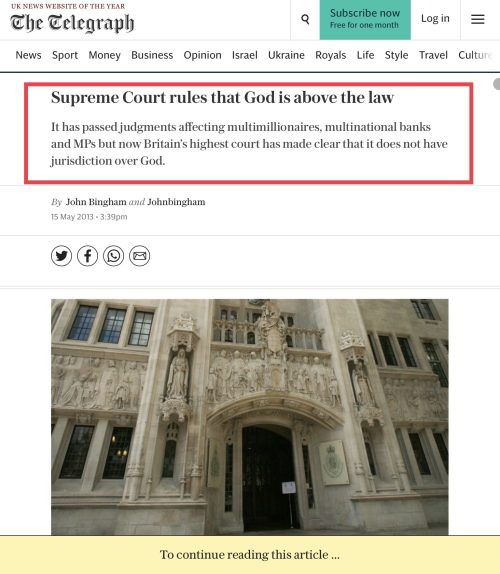
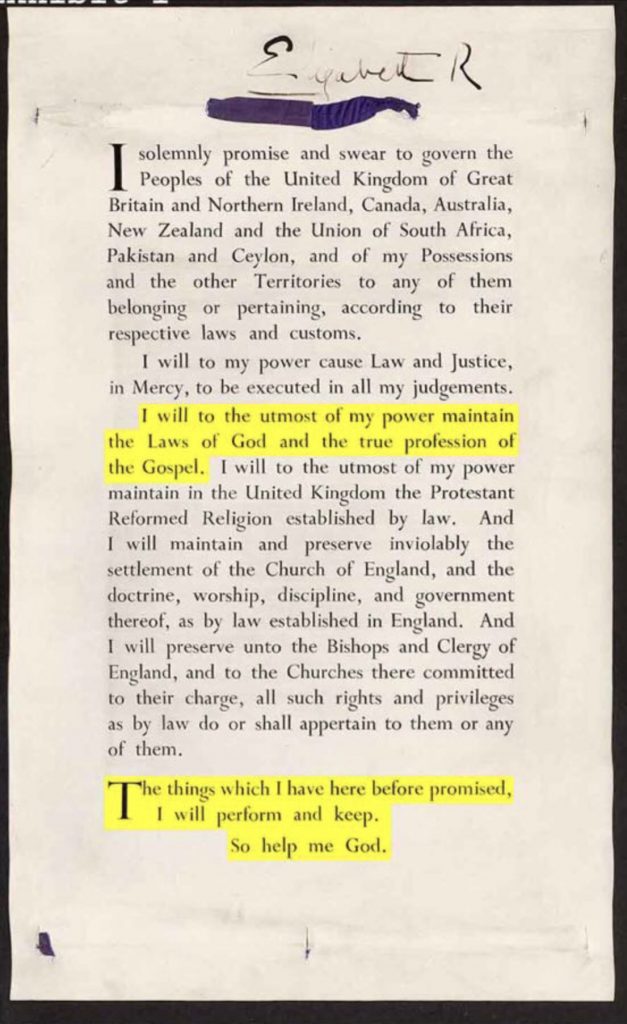
In Summary
Hopefully this article has given the you plenty to think about, and a few resources for how you might go about tackling your own legal issues.
When starting out in these articles I was keen not to make it too heavily scripture based, as I feared that may have put some commoner citizens off reading the articles. Ironically these are the very persons which I am aiming to help. However, when talking about law and governance in any serious discussion, it becomes nearly impossible not to reference or talk about the very topic whereby, all Law and Governance flows from. Attempting to discuss law and governance, and not talking about Scripture and God, is like talking about cars, and not mentioning engines, or wheels; it is going nowhere.
In this article I have covered a good few topics for you, and offered some practical tips and advice for the layperson on how you might go about beginning to make an argument. To argue, simply means “to make clear”, and that should be your target for communication. Clarify their words, and what they mean, never assume, and make clear what you mean. It may seem daunting at first, but with practice and understanding comes confidence. Start small, practice writing letters and researching relevant evidence. The hyperlinked words in each of these articles will take you to many useful resources and further your learning. In the beginning of my legal troubles, as sad as I am, I used to read a Blacks Law dictionary once a week for a few hours. Do that for a few months and you will soon build up a helpful knowledge of words. You may even start to realise, that the letters you receive from your adversary, are not saying what you assumed they were.
Do not be swayed or put off by “friends” and family from your research. You will need to be extremely single minded, and determined if you are to succeed as a “layperson litigant”. It is not for the feint hearted, and it is not for everyone. It is easier to learn if you are not under the pressure of a legal problem, but even if you are in the eye of the storm, it can focus your mind, as it did me. We have already discovered that a lot of persons do not know half as much as they believe they do. At least if you start to examine words, do your own research, and gain real tangible facts, and evidence, you will I am sure, start to begin to know things for yourself. See – What Do You Know?
We have a public Facebook group where discuss these topics. I highly encourage members to help each other, and debate each other over there. Good debate is great for sharpening up your arguments, and is to be encouraged.
If you feel that others would benefit from reading this article, please consider sharing it. If you would like to find out more about law and governance then you can start by reading my articles in ascending numerical order which will garner the best results for you.
More articles on Law and Governance can be read from the menu below.
If you feel like buying me a coffee, or making a donation, that would be greatly appreciated.
In good faith
CME